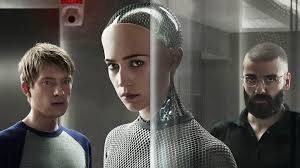 The creation of artificial human beings has a long history in literature and film, going back at least as far as Mary Shelley’s novel Frankenstein. In some ways, Ex Machina is similar to Ridley Scott’s Blade Runner (1982) but the differences between the two films are notable. Blade Runner is about a future in which pseudo-humans (called replicants) are a part of everyday life. Scott creates a whole new world through employment of effective and imaginative imagery.
The creation of artificial human beings has a long history in literature and film, going back at least as far as Mary Shelley’s novel Frankenstein. In some ways, Ex Machina is similar to Ridley Scott’s Blade Runner (1982) but the differences between the two films are notable. Blade Runner is about a future in which pseudo-humans (called replicants) are a part of everyday life. Scott creates a whole new world through employment of effective and imaginative imagery.
Ex Machina, by contrast, takes place today and is about the possible development of artificial human life. Its use of film techniques is much less bold and striking than in Blade Runner, but its plot is certainly interesting.
Caleb (Domhnall Gleeson), a twenty-six year old coder for a gigantic Internet company, is selected to go to the isolated home of the company’s genius head, Nathan (Oscar Isaac) for a special assignment. It turns out that Nathan thinks he has succeeded in creating the ultimate in artificial intelligence, identical to human intelligence with all its subtlety and self-consciousness, in the form of a female android named Ava (Alicia Vikander). He wants Caleb to interact with Ava, to test her to see whether her reactions are distinguishable from those of a human being.
The film depicts the interactions of Caleb with both Nathan and Ava, which consist mostly of conversation. To some extent, this is a film of ideas. For example, Caleb asks Nathan why he bothered to give the android any sex at all, and Nathan then discourses on the role of sexuality.
But it seems to me the film is more an intelligent thriller, in which the machinations involved are complex and surprising. That being the case, I would recommend this fine film even to those without a great liking for science fiction.

